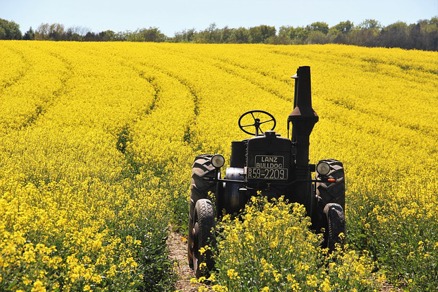Preparations for the Eighth Year

What can we do during the 7th year to prepare for the 8th year? Can we buy Vegetable and Tree seedlings just after Shemitah? And what about seeds?
A. Halachic Principles
- Acts performed to the soil to prepare it to be worked during the eighth year, such as: fertilizing, rock removal, clearing out the area, uprooting trees and orchards that are not producing in order to plant new trees or plants is forbidden miderabanan.[1]
- Acts done to protect the soil from damage[2] or acts that are only preparations for agricultural acts[3] are permitted, unless they are considered plowing.[4]
B. Agricultural acts for the soil
- It is forbidden to straighten out the ground to prepare it for work in the eighth year.[5]
- Digging ditches or holes[6] for planting in the eighth year is likewise forbidden.
- It is forbidden to sterilize the soil with chemicals,[7] even to prevent damage, unless the damage would be irreversible.
- Thermal sterilization of the soil, which involves breaking up soil, is forbidden, even to prevent damage.[8]
- Do not set up in irrigated areas containers with chemical fertilization if this fertilization is not needed for crops during the shemitah[9]
- It is forbidden to plant in the final days of the shemitah year, even though the crops will take root and sprout after the eighth year begins.[10]
C. Purchasing seeds, seedlings, and saplings
After the shemitah year, do not buy saplings from nurseries in a forbidden manner,[11] that is, that were not grown on detached platforms indoors or without relying on heter mechirah. The same is true for vegetable seedlings prepared in a forbidden manner.[12] Whoever purchased such saplings or seedlings accidentally should proceed as follows:
- Seedlings and saplings
- Vegetable seedlings prepared in a forbidden manner, when the part eaten has already grown, such as lettuce, are forbidden due to sefichin, and should not be planted.[13]
- Vegetable seedlings where the part eaten has not yet grown, such as cherry tomatoes, are not forbidden to use and can be planted.
- Tree saplings prepared in a forbidden manner should be uprooted and should certainly not be planted.[14]
- Seeds
- Inedible seeds are not subject to the sefichin prohibition, so it is permissible to sow them.[15]
- Edible seeds have kedushat shevi'it and are subject to the sefichin prohibition, so they should not be planted.[16]
- If the seeds were sterilized in a way that renders them inedible, it is permissible to sow them bedi'avad, but lechatchilah it is forbidden to sow them.[17]
- Even farmers who do not rely on heter mechirah may purchase seedlings from nurseries that prepared them during shemitah that rely on the [18]
[1] Rambam, Hilchot Shemitah 1:13-16.
[2] Ibid, 1:10. See also Shabbat Ha'aretz 1:10 §2-8.
[3] Chazon Ish 17:20, s.v. מ"ק, mikol makom). See also Shabbat Ha'aretz 1:5 §27-7.
[4] About Charishah, see the Consumer's Guide to Shemitah chapter 1b.
[5] Rambam, ibid., 2:11; Chazon Ish §27:5. See also Shabbat Ha'aretz 2:11 §1-2. This prohibition includes constructing terraces for sowing.
[6] See Rambam 1:4 and Radbaz, ibid.; Eglei Tal, choresh §2.
[7] As a derivative of plowing.
[8] Breaking up the top level of soil is considered plowing for all intents and purposes.
[9] Setting these up prepares for the eighth year.
[10] Minchat Chinuch §298:15.
[11] It is a mitzvah to uproot a tree planted during the shemitah year in a forbidden way: see Rambam 1:12; Shabbat Ha'aretz, ibid., §2. Of course, it is forbidden to plant such trees. Bedi'avad, however, its fruits are permitted; see Yerushalmi 2:4,5; Shabbat Ha'aretz, ibid., §4.
[12] See Katif Shevi'it 49 on purchasing from someone suspected of not keeping shemitah, that it is forbidden to buy items that could be grown in a forbidden fashion during shemitah. See also Rambam 8:14, Shabbat Ha'aretz, ibid., §1.
[13] See Rambam 4:7, Shabbat Ha'aretz, ibid., §2.
[14] See Rambam 1:12; Shabbat Ha'aretz, ibid., §4 about the fruit from such a tree.
[15] Chazon Ish §27:2, s.v. ובחזו"א (uba-chazon ish). This is the ruling of Rabbi Mordechai Eliahu. See also see the Consumer's Guide to Shemitah chapter 7.
[16] Chazon Ish §9:4, 27:2; Rabbi Tzvi Pesach Frank, Kerem Tzion 11, Gaon Tzvi §6); Torat Hashemitah §13:35. See also Shabbat Ha'aretz 5:3 §6 and nn. 52-54. This also relates to seeds grown in a permissible way by a farmer who planted crops before shemitah and did not sell the land through heter mechirah. These seeds also have kedushat shevi'it and may not be sown.
[17] Responsa Mishnat Yosef II §36.
[18] Since those who rely on heter mechirah are relying on a valid halachic opinion, it is not forbidden to purchase seedlings and seeds from them. See Kerem Tziyon 11 (Rabbi Tzvi Pesach Frank, Gaon Tzvi §6); Shabbat Ha'aretz 8:14 §7. There is a stringent opinion as well, not to buy such seedlings.




